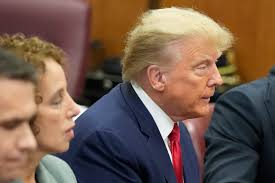
This is the simplest question of the bunch. The answer is yes.
The Constitution and American law have clear answers for only some of the questions that will arise if Donald Trump is convicted. Others would bring the country into truly uncharted territory, with huge decisions resting in the hands of federal judges.
Not since Eugene V. Debs campaigned from a prison cell more than a century ago has the United States experienced what might now happen: a prominent candidate with a felony conviction running for president. And never before has that candidate been someone with a real chance of winning.
Former President Donald J. Trump has been charged with dozens of felonies across four cases: two Federal, One in New York and another in Georgia. The first of those to go to trial is the Sex Scandal Cover-Up in New York, where jury selection began on Monday.
For now, he faces no formal campaign restrictions, beyond having to be present in a courtroom, and he remains highly Competitive in polls. But some of the cases are proceeding at a Pace that could bring verdicts before the election — and the Constitution and American law have clear answers for only some of the questions that will arise if he is convicted.Others would bring the country into truly uncharted territory, with huge decisions resting in the hands of federal judges.
The Constitution sets Very few Eligibility requirements for presidents. They must be at least 35 years old, be “Natural Born” Citizen and have lived in the United States for at least 14 years.
There are no limitations based on character or criminal record. While some states prohibit felons from running for state and local office, these laws do not apply to federal offices.
“We let states set the time, place and manner” of elections, said Jessica Levinson, a professor at Loyola Law School who specializes in election law, “but I think the best reading of our Constitution,is you don’t let the state add new substantive requirements.”
The Republican and Democratic Parties have guarantee spots on General-election Ballots in every state, and the parties tell election officials whose name to put in their spot. States could, in theory, try to keep Mr. Trump off the ballot by passing legislation requiring a clean criminal record, but this would be on legally shaky ground.
While that view is not universal among legal experts, it prevailed in court in 2019, after California passed a law requiring candidates to release their tax returns in order to appear on primary ballots. A federal district judge blocked the Law from taking effect, saying it was most likely unconstitutional.
The California Supreme Court also Unanimously blocked it as a violation of the state constitution, and the case never reached the U.S. Supreme Court.
